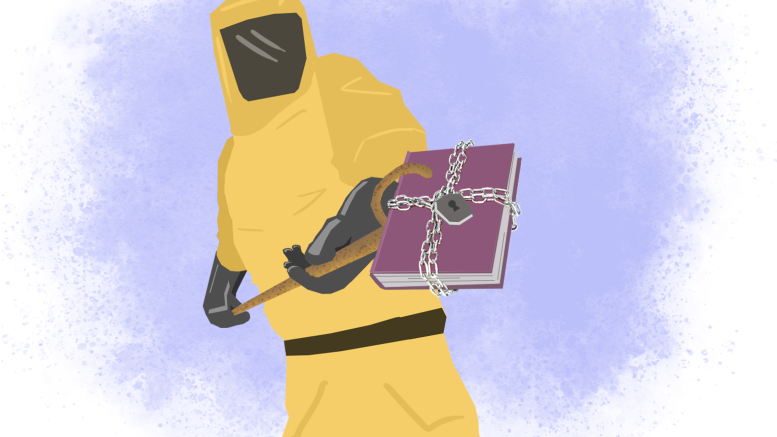Despite Winnipeg’s Pride parade drawing record-breaking numbers this year, my reflection on the month is soured by how urgently necessary this support was, coming on the heels of a recent surge in homophobic and transphobic action in Manitoba.
Prairie Rose School Division also heard a call to ban 2SLGBTQIA+ content from its school libraries on June 19. Morden faced a corrosive wave of anti-2SLGBTQIA+ vandalism in early June. In May, one Brandon constituent proposed banning “transgender books” from Brandon School Division libraries, which was shot down.
What catches my ear in the cacophony of each successive round of these discussions about gay or trans literature is the refrain that knowing about 2SLGBTQIA+ people has an almost corrupting effect. The Brandon delegate compared 2SLGBTQIA+ content in books to grooming and pedophilia that was “robbing children of their innocence” in her appeal of the decision.
Critical theorist Eve Kosofsky Sedgwick argued in the ’90s that gay panic exacerbated emerging ideas that gay people could “project their own desires into” straight people’s heads, as if merely knowing something infects you with the property of the thing you know. What followed fostered ignorance. That is, people fearmongering that breaking the public’s ignorance about gay people would make them gay made the public ignorant for real.
As transphobes’ inertia compels them to circle around the issue of banning books like vultures over carrion, it seems to me this conversation doesn’t just encourage ignorance in children. It reinforces children’s total subordination to their parents, even if their parents are stupefied by Google searches.
The consequence of that total subordination is that children’s rights are vague. Canada ratified the UN Convention on the Rights of Children in 1991, a treaty that lays out the rights of children. Article 3 of the treaty emphasizes that adults should have the best interests of children in mind when making decisions that could affect them. Meanwhile, Article 12 states that children’s views and opinions should be respected and taken into account.
These are nice sentiments. However, not only are there times when what adults think is best for children conflicts with a child’s opinions, as far as I can see these articles do not materialize in ways that actually give children more control over their own lives.
Canada’s approach to children’s rights leaves much of children’s lives in the total control of their parents, with stipulations across provinces’ legislation and even across sectors like health-care and education as to when minors’ rights supersede their parents’ will.
Across Canada, the mature minor doctrine states parents’ entitlement to make decisions on their child’s behalf may be nullified when a minor is “sufficiently mature” to the point where they can give informed consent.
For example, in B.C., the Infants Act enables health-care providers to administer care without parental consent if the health-care provider deems the minor understands the treatment and its outcomes. In Manitoba, trans minors are allowed to change their sex designation on their birth certificate if they are “able to appreciate” the nature of the treatment and its “consequences.” However, minors’ applications to change their name still must be filed by a legal guardian.
In general, kids are at the mercy of their parents. This puts trans kids in especially difficult situations if their legal guardians believe the bare visibility of trans identities in books is equivalent to pedophilia. I think the sinister undercurrent to this conversation is that restricting children’s access to information is effectively a way of stripping them of autonomy in situations where their guardian cannot make an evidence-based judgment on their behalf.
These appeals to ban books are working to rob trans kids of the tools they would need to demonstrate they are “sufficiently mature” to make their own decisions and give informed consent.
Having access to information is what ensures minors’ choices override their parents’ custodial role over them. Where are minors supposed to get information if 2SLGBTQIA+ content is banned or censored in schools and their parents equate 2SLGBTQIA+ identities to innocence lost?
Genuine concern about children’s rights and safety should be paired with a productive objective, such as expanding children’s rights. What these appeals seem to do is recast knowledge about trans people and the rest of the 2SLGBTQIA+ community as political and ignorance as a neutral or apolitical state of being.
In queer theorist Lee Edelman’s book No Future, he argues that the appeals to think of the children are actually calling for the politics of the present to be authenticated and solidified into the future. This tactic is a way to frame teaching kids as a political move and keeping them in the dark as not political.
Edelman also pointed out that demands to think of the children impose a limit on conversation. It seems that we can’t even have conversations about expanding children’s worlds based on what is already happening to them because someone is aflutter about what might happen to the children. Conveniently, what trans kids are already dealing with is allowed to just be normal while talking about how to make life better for them is political.
It’s important to understand the full ramifications of these appeals to ban books. Efforts like these ensure trans kids are even more at the mercy of capricious guardians. We need to treat that prospect seriously.


